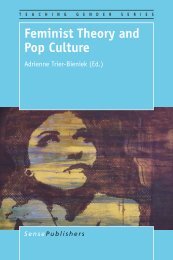EDITORS’ PREFACEstructure, of how students experience difficulty, as well as new dimensions oftroublesome knowledge <strong>and</strong> how we might both render conceptual underst<strong>and</strong>ingvisible <strong>and</strong> assess it in a more dynamic fashion. The concluding section containsa substantial body of writing which furthers our underst<strong>and</strong>ing of the ontologicaltransformations that are necessarily occasioned by significant <strong>learning</strong>, the <strong>learning</strong><strong>threshold</strong>s, as we might term them, which might not be strictly conceptual, butare more concerned with shifts in identity <strong>and</strong> subjectivity, with proceduralknowledge, or the ways of thinking <strong>and</strong> practising customary to a given disciplinaryor professional community. We see here too, intriguing migratory instancesof the application of <strong>threshold</strong> theory to other sectors of education, to doctoraleducation, to professional <strong>learning</strong> <strong>and</strong> even to the social analysis of an entirenation in transition.Taking this into consideration we feel emboldened to see the consolidation ofthe characteristics of <strong>threshold</strong> <strong>concepts</strong>, <strong>and</strong> of <strong>learning</strong> <strong>threshold</strong>s more generally,that were proposed in a tentative fashion in the seminal paper by Meyer <strong>and</strong> L<strong>and</strong>(2003). If viewed as a journey through preliminal, liminal <strong>and</strong> postliminal states,the features that characterise <strong>threshold</strong> <strong>concepts</strong> can now be represented relationally.In such a view the journey towards the acquisition of a <strong>threshold</strong> concept isseen to be initiated by an encounter with a form of troublesome knowledge in thepreliminal state. The troublesome knowledge inherent within the <strong>threshold</strong> <strong>concepts</strong>erves here as an instigative or provocative feature which unsettles prior underst<strong>and</strong>ingrendering it fluid, <strong>and</strong> provoking a state of liminality. Within the liminalstate an integration of new knowledge occurs which requires a reconfiguring ofthe learner’s prior conceptual schema <strong>and</strong> a letting go or discarding of any earlierconceptual stance. This reconfiguration occasions an ontological <strong>and</strong> an epistemicshift. The integration/reconfiguration <strong>and</strong> accompanying ontological/epistemic shiftcan be seen as reconstitutive features of the <strong>threshold</strong> concept. Together thesefeatures bring about the required new underst<strong>and</strong>ing. As a consequence of this newunderst<strong>and</strong>ing the learner crosses a conceptual boundary into a new conceptualspace <strong>and</strong> enters a postliminal state in which both <strong>learning</strong> <strong>and</strong> the learner aretransformed. This is an irreversible transformation <strong>and</strong> is marked by a changeduse of discourse. These latter effects – the crossing of conceptual boundaries,transformation, irreversibility <strong>and</strong> changed discourse – can be characterised asconsequential features of the <strong>threshold</strong> concept. These dynamics are summarised inFigure 1.We would not, however, wish to imply that this relational view has an overlyrigid sequential nature. It has been emphasised elsewhere (L<strong>and</strong> et al, 2005) thatthe acquisition of <strong>threshold</strong> <strong>concepts</strong> often involves a degree of recursiveness, <strong>and</strong>of oscillation, which would need to be layered across this simple diagram.Furthermore, running thoughout this <strong>transformational</strong> process, in what we mightterm the ‘subliminal’ mode, there is often an ‘underlying game’ in which ways ofthinking <strong>and</strong> practising that are often left tacit come to be recognised, grappledwith <strong>and</strong> gradually understood. This underlying game is a common feature of theprocesses of entry, meaning making <strong>and</strong> identity formation typically required forentry to a given community of practice.xi
LAND ET ALModePreliminalLiminalPostliminalFeature• Encounterwithtroublesomeknowledge• Integration• Discarding• Ontological<strong>and</strong> epistemicshift• Transformation• Irreversibility• Crossingconceptualboundaries• ChangeddiscourseType ofFeatureInstigative Reconstitutive ConsequentialFigure 1. A relational view of the features of <strong>threshold</strong> <strong>concepts</strong>.xiiTRANSFORMATIONIt is the nature <strong>and</strong> process of this transformation or reconfiguring which thisvolume particularly seeks to address. A number of resonances can be identifiedbetween the <strong>threshold</strong>s approach <strong>and</strong> work undertaken in the field of <strong>transformational</strong><strong>learning</strong>. The first seminal paper identified correspondences with Mezirow’swork (1978, 1990) on ‘perspective transformation’.Perspective transformation is the process of becoming critically aware of how<strong>and</strong> why our presuppositions have come to constrain the way we perceive,underst<strong>and</strong>, <strong>and</strong> feel about our world; of reformulating these assumptions topermit a more inclusive, discriminating, permeable <strong>and</strong> integrative perspective;<strong>and</strong> of making decisions or otherwise acting on these new underst<strong>and</strong>ings.(Mezirow, 1990, p. 14)Mezirow saw transformation being triggered by what he termed a ‘disorientingdilemma’. In his analysis the meaning schemes that we hold concerning a particularphenomenon or situation are unsettled by the disorienting dilemma or challengingperspective <strong>and</strong> occasion a series of phases, often involving a phase of withdrawalor disengagement prior to a re-engagement in which the integration of the differentperspective is integrated. We recognise a number of correspondences here with theinstigative effect of <strong>threshold</strong> <strong>concepts</strong>, the liminal phase of <strong>threshold</strong>s theory <strong>and</strong>the process of integration it entails.A recurring critique of Mezirow’s work on perspective transformation, however,has concerned its continued emphasis on the rational <strong>and</strong> analytic nature of thecritical reflection that is seen as a primary driver. Boyd <strong>and</strong> Myers (Boyd, 1989,1991; Boyd <strong>and</strong> Myers, 1988) offer an alternative approach, originating in depthpsychology, which balances rational reflection with an emphasis on affective
- Page 1 and 2: EDUCATIONAL FUTURES: RETHINKING THE
- Page 3 and 4: EDUCATIONAL FUTURESRETHINKING THEOR
- Page 5 and 6: A C.I.P. record for this book is av
- Page 7 and 8: TABLE OF CONTENTS10. Threshold Conc
- Page 9 and 10: Pax Intrantibus Salus Exeuntibus. L
- Page 11: LAND ET ALstudents experience diffi
- Page 15 and 16: LAND ET AL(Barker, 1991, p.184). Th
- Page 17 and 18: LAND ET ALvariations arising from t
- Page 19 and 20: LAND ET ALform of a model of concep
- Page 21 and 22: LAND ET ALQuestions of intersection
- Page 24 and 25: EDITORS’ PREFACEstudents bring to
- Page 26 and 27: EDITORS’ PREFACEconcepts in the f
- Page 28 and 29: EDITORS’ PREFACEIn the final illu
- Page 30 and 31: EDITORS’ PREFACEhence becomes a n
- Page 32 and 33: EDITORS’ PREFACElearning. This th
- Page 34 and 35: EDITORS’ PREFACEa lens or ‘way
- Page 36 and 37: EDITORS’ PREFACEHence learning is
- Page 38 and 39: EDITORS’ PREFACEthe Communitas, w
- Page 40 and 41: EDITORS’ PREFACEBuilding on these
- Page 42 and 43: EDITORS’ PREFACECousin, G. (2009)
- Page 44 and 45: DAVID PERKINSFOREWORDEntrance…and
- Page 46: FOREWORDMeyer, J.H.F., Land, R. & D
- Page 50 and 51: JULIE A. TIMMERMANS1. CHANGING OUR
- Page 52 and 53: CHANGING OUR MINDSKegan’s (1982)
- Page 54 and 55: CHANGING OUR MINDSKegan describes e
- Page 56 and 57: CHANGING OUR MINDSIn fact, Kegan an
- Page 58 and 59: CHANGING OUR MINDSat the epistemolo
- Page 60 and 61: CHANGING OUR MINDSMight a learner r
- Page 62 and 63:
CHANGING OUR MINDSreveals an additi
- Page 64 and 65:
CHANGING OUR MINDSBendixen, L. D.,
- Page 66:
CHANGING OUR MINDSSibbett, C., & Th
- Page 69 and 70:
SCHWARTZMANScholarship in liminalit
- Page 71 and 72:
SCHWARTZMANTC: the entityThe term T
- Page 73 and 74:
SCHWARTZMANA resource for teaching
- Page 75 and 76:
SCHWARTZMANunprecedented to attract
- Page 77 and 78:
SCHWARTZMANspectrum of scholarship
- Page 79 and 80:
SCHWARTZMANrupture and phenomenolog
- Page 81 and 82:
SCHWARTZMANfield(s) of one’s cons
- Page 83 and 84:
SCHWARTZMAN36DATA: PARTICULARS GIVI
- Page 85 and 86:
SCHWARTZMANchallenge than interpret
- Page 87 and 88:
SCHWARTZMANStrategies for Teaching:
- Page 89 and 90:
SCHWARTZMANThey are redefined here
- Page 91:
SCHWARTZMANLoder, J. (1981). The tr




